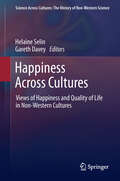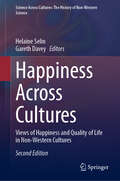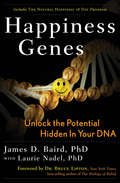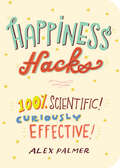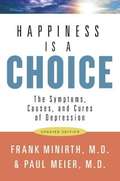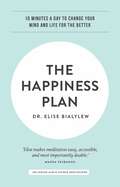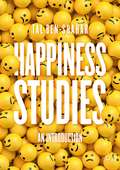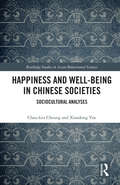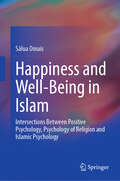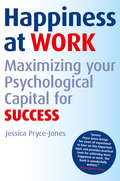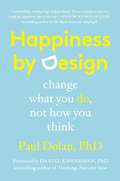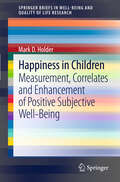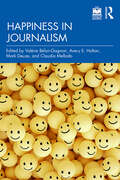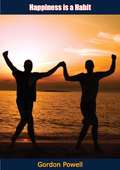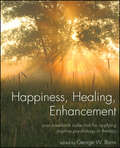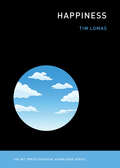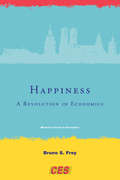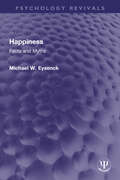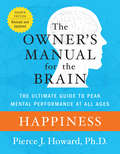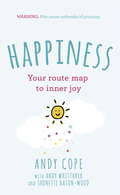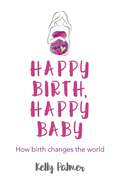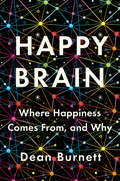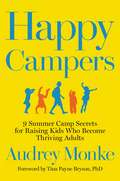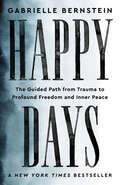- Table View
- List View
Happiness Across Cultures
by Helaine Selin Gareth DaveyDifferent cultures experience happiness differently. Traditionally, the West is considered materialistic, and happiness is said to come from achievement and acquisition. The East is said to be more people-oriented, where happiness is a result of deep personal interactions. Thus, poor people can be happier in the East than the West, because they are not so concerned with possession and more with society. This book considers happiness and quality of life in non-Western countries and cultures. Its coverage is diverse and spans the breadth of the non-Western world, revealing unique perspectives of happiness and life quality embedded in rich cultural traditions and histories.
Happiness Across Cultures: Views of Happiness and Quality of Life in Non-Western Cultures (Science Across Cultures: The History of Non-Western Science #6)
by Helaine Selin Gareth DaveyThis second edition of Happiness Across Cultures contains 8 brand new chapters on previously uncovered topics, such as Covid19, refugees, and violence. Different cultures experience happiness differently. Traditionally, the West is considered materialistic, and happiness is said to come from achievement and acquisition. The East is said to be more people-oriented, where happiness is a result of deep personal interactions. Thus, poor people can be happier in the East than the West, because they are not so concerned with possession and more with society. This new edition considers happiness and quality of life in non-Western countries and cultures. Its coverage is now more diverse and spans the breadth of the non-Western world, revealing unique perspectives of happiness and life quality embedded in rich cultural traditions and histories.
Happiness Genes: Unlock the Positive Potential Hidden in Your DNA
by Laurie Nadel James D. BairdHow the science of epigenetics reveals that we&’re wired for natural happiness—includes a 28-day plan to create a biological cascade of well-being. Happiness Genes explores the surprising link between science and spirituality—and makes it clear that happiness can&’t be bought. It&’s actually at our fingertips—or more precisely, in our DNA. The new science of epigenetics reveals that there are reserves of natural happiness within your DNA that can be controlled by you—your emotions, beliefs, and behavioral choices. This book examines the nature and source of happiness, from ancient times to the present. It presents the epigenetic and other biological research that shows that DNA contains genes for natural happiness and your ultimate well-being. Then it details the 28-Day natural happiness program—to show you how to switch on your own happiness genes.
Happiness Hacks: 100% Scientific! Curiously Effective!
by Alex PalmerHighly Effective Hacks From Totally True Facts! Could you be happier at work . . . in love . . . in life? You may not need a total overhaul—just a few good Happiness Hacks! Here are hundreds of shortcuts to brighten your day and boost your mood—and the science behind how they work. Discover why . . . 57°F (13.9°C) is the happiest temperature Selfies give you a jolt of joy Renters have a surprising edge over homeowners 17-minute breaks are the most productive Intimacy is better than sex It’s more satisfying to work a full 40-hour week Date night is the key to a happy marriage Just 10 minutes of exercise can cheer you up! Whether you’re seeking better health, stronger friendships, or that elusive “happy place,” these stunningly simple tips are proven to help. You can hack your way to happiness!
Happiness Is a Choice: The Symptoms, Causes, and Cures of Depression
by Frank Minirth Paul MeierWhether depression is felt mildly or acutely, temporarily or persistently, it strikes nearly everyone. Drs. Minirth and Meier believe, however, that the emotional pain of depression can be overcome or altogether avoided. Happiness Is a Choice explores the complex relationship between spiritual life and psychological health and then spell out basic steps for recovering from depression and maintaining a happy, fulfilling life.
Happiness Plan
by Elise BialylewWhat if you could train your brain to experience greater happiness, focus, and emotional balance in daily life? What if it took just ten minutes a day?In The Happiness Plan, Dr Elise Bialylew offers a roadmap to a happier life. Drawing on her background in medicine, psychiatry and mindfulness meditation, she has created a powerful one-month mindfulness program that will lead you to a more balanced and fulfilled existence.In this transformative guidebook you'll discover simple practices to:Increase your sense of wellbeing, balance and joyReduce stress and worry (and its negative impact on your body)Improve your focus, performance and fulfilment at workCreate more fulfilling relationshipsIncrease your sense of purpose, connection and meaning in life.Featuring access to guided audio meditations, daily mindfulness exercises, fascinating scientific insights and recipes to inspire mindful eating, The Happiness Plan has the power to transform your mind, and your life.
Happiness Studies: An Introduction
by Tal Ben-ShaharIn this book, Tal Ben-Shahar introduces a new interdisciplinary field of study that is dedicated to exploring happiness. The study of happiness ought not be left to psychologists alone. Philosophers, theologians, biologists, economists, and scholars from other disciplines have explored ways of attaining happiness, and to do justice to this important pursuit, we ought to listen to their words and experiment with their prescriptions. Not only does the field of happiness studies embrace different disciplines, it also approaches happiness as a multifaceted and multidimensional variable that includes five parts which form the acronym SPIRE:Spiritual wellbeingPhysical wellbeingIntellectual wellbeingRelational wellbeingEmotional wellbeing This book addresses each of these elements of happiness, explains them, and addresses practical ways for their cultivation.
Happiness and Well-Being in Chinese Societies: Sociocultural Analyses (Routledge Studies in Asian Behavioural Sciences)
by Xiaodong Yue Chau-kiu CheungThis book addresses the sustainability of happiness and well-being in Chinese societies. It starts by introducing the various conceptions of well-being, particularly in the Chinese sociocultural context. The book then proceeds with the examination of the sustainability of well-being by scrutinizing the effects of sociocultural, contextual, and personal factors on well-being. The contextual factors are the aggregates or averages of personal factors at the contextual levels of the regions and colleges in Mainland China, its special administrative region, and Taiwan. These factors cover personality traits, strengths, orientations, beliefs, values, and idolizing. By bringing together empirical studies and theoretical perspectives applied to Chinese societies, this book offers researchers in social science and humanities a valuable reference work on happiness and well-being in Chinese societies.
Happiness and Well-Being in Islam: Intersections Between Positive Psychology, Psychology of Religion and Islamic Psychology
by Sálua OmaisThis book presents a theoretical model to understand happiness and well-being in Islam combining a positive psychology approach and the teachings of the Quran and the Sunnah. With the evolution of positive psychology, the study of well-being gained broader and deeper dimensions that today encompass different peoples, cultures, and worldviews. The fact that most of the knowledge disseminated around the world has been built from a Western perspective has created gaps in science about non-Western people&’s cultures and worldviews. This reality has given rise to new epistemological trends, such as the revival of Islamic psychology, which seeks to recover classic knowledge and include new theoretical perspectives on the human psyche in line with Islamic beliefs and values. The topic of well-being in Islam has aroused interest among Western researchers in recent years, both in positive psychology, due to its third wave, and in the field of the psychology of religion. While Western science fragments knowledge into different areas of psychology, focusing on behaviors and actions that generate positive emotional states and relationships, the conception of well-being in Islāmic psychology seems to coordinate all these behaviors with values, meanings, and spiritual connections, integrating content from various approaches holistically. It is a system that connects beliefs, religious teachings, spiritual practices, and prosocial behaviors, based on a logic in which God, the individual, and society are closely related to each other. Happiness and Well-Being in Islam will be of interest to both researchers and practitioners in fields such as clinical psychology, psychological assessment, positive psychology, psychology of religion and Islāmic psychology by providing theoretical insights to research as well as valuable information that can contribute to the construction of measurement instruments, interventions, and therapeutic practices in the clinical field, and also in areas such as education, health, social and organizational environments.
Happiness at Work
by Jessica Pryce-JonesSharing the results of her four-year research journey in simple, jargon-free language, Pryce-Jones exposes the secrets of being happy at work.Focuses on what happiness really means in a work context and why it matters to individuals and organisations in both human and financial termsEquips readers with the information, knowledge and skills to make the most of the nearly 100,000 hours that they'll spend at work over a lifetimeDemystifies psychological research through a fascinating array of anecdotes, case studies, and interviews from people in the trenches of the working world, including business world-leaders, politicians, particle physicists, and philosophers, sheep farmers, waitresses, journalists, teachers, and lawyers, to name just a few
Happiness by Design
by Daniel Kahneman Paul DolanThis is not just another happiness book. In Happiness by Design, happiness and behavior expert Paul Dolan combines the latest insights from economics and psychology to illustrate that in order to be happy we must behave happy Our happiness is experiences of both pleasure and purpose over time and it depends on what we actually pay attention to. Using what Dolan calls deciding, designing, and doing, we can overcome the biases that make us miserable and redesign our environments to make it easier to experience happiness, fulfilment, and even health. With uncanny wit and keen perception, Dolan reveals what we can do to find our unique optimal balance of pleasure and purpose, offering practical advice on how to organize our lives in happiness-promoting ways and fresh insights into how we feel, including why: * Having kids reduces pleasure but gives us a massive dose of purpose * Gaining weight won't necessarily make us unhappier, but being too ambitious might * A quiet neighborhood is more important than a big house Vividly rendering intriguing research and lively anecdotal evidence, Happiness by Design offers an absorbing, thought-provoking, new paradigm for readers of Stumbling on Happiness and The How of Happiness.
Happiness in Children
by Mark D. HolderThis briefs summarizes the research on positive well-being in children, with a particular focus on their happiness. It starts with a discussion of the constructs of positive psychology (i.e., well-being, happiness and life satisfaction), and then outlines the research that shows the importance of studying well-being. Next, it explores how researchers measure happiness and what these measures tell us about whether children are happy and how their happiness differs from adults. Following this, it discusses current positive psychology theories with the aim of suggesting their promise in understanding children's well-being. Next, it examines the importance of individual differences, including culture and temperament. Because studies have only recently identified several of the factors associated with children's happiness, the book ends with a discussion of how we might enhance children's well-being and suggests directions for future research.
Happiness in Journalism
by Mark Deuze Claudia Mellado Valérie Bélair-Gagnon Avery E. HoltonThis book examines how journalism can overcome harmful institutional issues such as work-related trauma and precarity, focusing specifically on questions of what happiness in journalism means, and how one can be successful and happy on the job. Acknowledging profound variations across people, genres of journalism, countries, types of news organizations, and methodologies, this book brings together an array of international perspectives from academia and practice. It suggests that there is much that can be done to improve journalists’ subjective well-being, despite there being no one-size-fits-all solution. It advocates for a shift in mindset as much in theoretical as in methodological approaches, moving away from a focus on platforms and adaptation to pay real attention to the human beings at the center of the industry. That shift in mindset and approach involves exploring what happiness is, how happiness manifests in journalism and media industries, and what future we can imagine that would be better for the profession. Happiness is conceptualized from both psychological and philosophical perspectives. Issues such as trauma, harassment, inequality, digital security, and mental health are considered alongside those such as precarity, recruitment, emotional literacy, intelligence, resilience, and self-efficacy. Authors point to norms, values and ethics in their regions and suggest best practices based on their experience. Constituting a first-of-its-kind study and guide, Happiness in Journalism is recommended reading for journalists, educators, and advanced students interested in topics relating to journalists’ mental health and emotion, media management, and workplace well-being. This book is accompanied by an online platform which supports videos, exercises, reports and links to useful further reading.
Happiness is a Habit
by Gordon PowellThe most dominating goal of the average person today is to find happiness.Clergymen, doctors, sociologists and specialists in human nature will generally agree that the above statement accurately reflects the times. A famous author-minister—Gordon Powell—has written an inspirational book based on the above statement.Gordon Powell was minister of St. Stephen’s Presbyterian Church in Sydney, Australia. One unique aspect of this church was the lunch-hour service every Wednesday for professional and business people. This service was broadcast by eighteen radio stations, in four states of the continent, to an area covering ninety per cent of the population. It was also shown on television in the areas of Sydney, Melbourne and Adelaide. St. Stephen’s claimed the largest attendance of any Protestant church in Australia.Another spiritually creative feature of Gordon Powell’s ministry is the “Faith Builder” cards, over a million of which have been printed and distributed. The cards contain both a scriptural guide for living, plus a modern interpretation or adaptation of the Biblical wisdom. Each of the twelve chapters in Happiness Is A Habit ends with a “Faith Builder,” and these “Faith Builders” are printed again in a separate section at the end of the book in case you should want to clip them out for personal use.Happiness is a Habit digs into the heart of today’s complexities, offering helpful guidance and spiritual nourishment to the reader.“A sensible philosophy of life, based on the teaching of the Sermon on the Mount, and teaching that the secret of happiness lies in right thinking and in the application of a positive faith to everyday life.”—The Times Literary Supplement
Happiness, Healing, Enhancement
by Burns George W.Praise for Happiness, Healing, Enhancement "Filled with good strategies based in research, compelling case material, and most importantly, practical advice, this book belongs in the library of everyone interested in what it means to live well. It provides not only ample food for thought, but for action. " -Christopher Peterson, Professor of Psychology, University of Michigan "If you are a therapist, a coach-or if you want to help yourself and others flourish-then this book is a must-read. It is an important theoretical and practical contribution to the field of positive psychology-and, in fact, to the field of psychology as a whole. " -Tal Ben-Shahar, author of Happier and The Pursuit of Perfect A practical guide to applying the principles of positive psychology in your mental health practice Edited by internationally recognized psychologist, author, and therapist trainer George Burns, Happiness, Healing, Enhancement: Your Casebook Collection for Applying Positive Psychology in Therapy provides thought-provoking yet realistic and practical contributions from practitioners of positive psychology from around the world who share how they have translated solid, positive psychology research into sound clinical practice. Organized to make searching for a particular diagnostic category or therapeutic outcome fast and easy, this guide features: Contributions from some of the world's foremost positive psychology clinicians, researchers, and teachers, including P. Alex Linley, Betty Alice Erickson, Robert Weis, Antonella Delle Fave, Richard G. Tedeschi, Robert Biswas-Diener, Michael D. Yapko, and Bill O'Hanlon Examples and strategies including a "Putting It into Practice" feature that illustrates how readers can immediately apply the therapeutic applications covered in each chapter Building on the proven benefits of the positive psychology movement, Happiness, Healing, Enhancement will teach you new skills that will strengthen your practice of therapy and equip your clients with the pathways to overcome challenging problems and live a full, satisfying life.
Happiness: A Cross-cultural Lexicon Of Well-being (The MIT Press Essential Knowledge series)
by Tim LomasA concise and engaging exploration of how we understand happiness.What does it mean to feel happiness? As a state of mind, it&’s elusive. As a concept—despite the plethora of pop psychology books on the subject—it&’s poorly understood. In this volume in the MIT Press Essential Knowledge series, psychologist Tim Lomas offers a concise and engaging overview of our current understanding of happiness. Lomas explains that although the field of positive psychology, which focuses on happiness, emerged only in the last twenty-five years, interest in the meaning of happiness goes back several millennia. Drawing on a variety of disciplines, from philosophy and sociology to economics and anthropology, Lomas offers an expansive vision of what happiness means, exploring a significant range of experiential territory. After considering such related concepts as wellbeing and flourishing, Lomas traces ideas of happiness from the ancient Buddhist notions of sukha and nirvana through Aristotle&’s distinction between hedonic and eudaemonic happiness to today&’s therapeutic and scientific approaches. He discusses current academic perspectives, looking at the breadth of happiness research across disciplines; examines the mechanics of happiness—the physiological, psychological, phenomenological, and sociocultural processes that make up happiness; explores the factors that influence happiness, both individual and social; and discusses the cultivation of happiness.
Happiness: A Revolution in Economics (Munich Lectures in Economics)
by Bruno S. FreyA leading economist discusses the potential of happiness research (the quantification of well-being) to answer important questions that standard economics methods are unable to analyze.Revolutionary developments in economics are rare. The conservative bias of the field and its enshrined knowledge make it difficult to introduce new ideas not in line with received theory. Happiness research, however, has the potential to change economics substantially in the future. Its findings, which are gradually being taken into account in standard economics, can be considered revolutionary in three respects: the measurement of experienced utility using psychologists' tools for measuring subjective well-being; new insights into how human beings value goods and services and social conditions that include consideration of such non-material values as autonomy and social relations; and policy consequences of these new insights that suggest different ways for government to affect individual well-being. In Happiness, emphasizing empirical evidence rather than theoretical conjectures, Bruno Frey substantiates these three revolutionary claims for happiness research. After tracing the major developments of happiness research in economics and demonstrating that we have gained important new insights into how income, unemployment, inflation, and income demonstration affect well-being, Frey examines such wide-ranging topics as democracy and federalism, self-employment and volunteer work, marriage, terrorism, and watching television from the new perspective of happiness research. Turning to policy implications, Frey describes how government can provide the conditions for people to achieve well-being, arguing that a crucial role is played by adequate political institutions and decentralized decision making. Happiness demonstrates the achievements of the economic happiness revolution and points the way to future research.
Happiness: Facts and Myths (Psychology Revivals)
by Michael W EysenckFirst published in 1990, Happiness is based fairly and squarely on scientific evidence and provides realistic insights into the following questions: What is happiness? How can you tell if you are happy? How important are love, sex, money, and family relationships? Can happiness last? Is there a blueprint for happiness? Is unhappiness a terminal illness? Is there a ‘happiness gone’? This book will be of interest to students of psychology and other mental health experts.
Happiness: The Owner's Manual
by Pierce HowardCutting-edge, user-friendly, and comprehensive: the revolutionary guide to the brain, now fully revised and updatedAt birth each of us is given the most powerful and complex tool of all time: the human brain. And yet, as we well know, it doesn't come with an owner's manual--until now. In this unsurpassed resource, Dr. Pierce J. Howard and his team distill the very latest research and clearly explain the practical, real-world applications to our daily lives. Drawing from the frontiers of psychology, neurobiology, and cognitive science, yet organized and written for maximum usability, The Owner's Manual for the Brain, Fourth Edition, is your comprehensive guide to optimum mental performance and well-being. It should be on every thinking person's bookshelf. What are the ingredients of happiness? Which are the best remedies for headaches and migraines? How can we master creativity, focus, decision making, and willpower? What are the best brain foods? How is it possible to boost memory and intelligence? What is the secret to getting a good night's sleep? How can you positively manage depression, anxiety, addiction, and other disorders? What is the impact of nutrition, stress, and exercise on the brain? Is personality hard-wired or fluid? What are the best strategies when recovering from trauma and loss? How do moods and emotions interact? What is the ideal learning environment for children? How do love, humor, music, friendship, and nature contribute to well-being? Are there ways of reducing negative traits such as aggression, short-temperedness, or irritability? What is the recommended treatment for concussions? Can you delay or prevent Alzheimer's and dementia? What are the most important ingredients to a successful marriage and family? What do the world's most effective managers know about leadership, motivation, and persuasion? Plus 1,000s more topics!
Happiness: Your route-map to inner joy
by Andy CopeHappiness, calm and enlightenment need not be elusive concepts which we hear of in theory but are never able to capture. This funny, practical book by Andy Cope, the Dr of Happiness, will show you how to transform your thinking, change gear and find a fresh new perspective that will leave you better focused on the things that matter, healthier and a great deal happier.ABOUT THIS SERIESLittle Books are accessible and engaging books with a focus on personal development and business topics, delivering quick, outcome-focused results, ideal for self-improvement junkies, commuters, or business readers.
Happiness: Your route-map to inner joy
by Andy Whittaker Andy Cope Shonette Bason-WoodHappiness, calm and enlightenment need not be elusive concepts which we hear of in theory but are never able to capture. This funny, practical book by Andy Cope, the UK's first Dr of Happiness, will show you how to transform your thinking, change gear and find a fresh new perspective that will leave you better focused on the things that matter, much healthier and a great deal happier.Happiness is the definitive route map that shows you not only where, but also how. It teaches you to harness your thoughts, memories, ideas and attention to embrace 'now', experience more joy and live a truly flourishing life.This book is a wake-up call to stop skimming the surface of life, take charge of your attitude and set your path for enlightenment.Buckle up. You can expect peril, thrills, science and lots of laughter along the way.
Happy Birth Happy Baby
by Glen ThomasHave a positive birth for you and your baby; and heal the world in the process! Birth is powerful. A happy birth is one that empowers you to make the choices that are best for you and your baby. Birth makes a difference; to mothers, to babies and to the world. Happy Birth, Happy Baby is a practical and inspiring guide to having a positive birth experience. Featuring cutting-edge research as well as exercises including self-hypnosis, journaling, birth art, mindfulness exercises and even dancing, Happy Birth Happy Baby is a sourcebook for all expectant mothers who want to reclaim their births.
Happy Brain: Where Happiness Comes From, And Why
by Dean BurnettNeuroscientist Dean Burnett dives into the squishy science and bubbly feelings of what happiness means. The pursuit of happiness is one of the most common and enduring quests of human life. It’s what drives us to get a job, fall in love, watch stand-up comedy, go to therapy, have questionable obsessions, and come home at the end of the day. But where does happiness come from, and why do we need it so much? Is lasting, permanent happiness possible—or should it be? And what does any of this have to do with the brain? In this delightful sequel to Idiot Brain, Dean Burnett explores these questions from a neuroscientific perspective. He combines the latest research and theories about how the brain works with interviews and contributions from relevant individuals, such as relationship experts, psychology professors, comedy writers, celebrities, millionaire gurus, and pretty much anyone else involved in bringing about happiness in others. Distinguished by Burnett’s signature wit and curiosity, Happy Brain elucidates our understanding of what happiness actually is, where it comes from, and what exactly is going on in our brains when we’re in a cheery state. Humorous and enlightening, Happy Brain explores a fascinating aspect of modern neuroscience and, in the process, reveals something about what it means to be human.
Happy Campers: 9 Summer Camp Secrets for Raising Kids Who Become Thriving Adults
by Audrey MonkeAudrey "Sunshine" Monke, mother of five and camp owner-director, shares nine powerful parenting techniques-inspired by the research-based practices of summer camp-to help kids thrive and families become closer. Research has proven that kids are happier and gain essential social and emotional skills at camp. A recognized parenting expert, Audrey Monke distills what she's learned from thousands of interactions with campers, camp counselors, and parents, and from her research in positive psychology, to offer intentional strategies parents can use to foster the benefits of camp at home. Our screen-obsessed, competitive society makes it harder than ever to raise happy, thriving kids. But there are tried-and-true methods that can help. Instead of rearing a generation of children who are overwhelmed, anxious, depressed, and who struggle to become independent, responsible adults, parents can create a culture that promotes the growth of important character traits and the social skills kids need for meaningful, successful lives. Thousands of parents attest to the "magical" benefits of summer camp for their kids, noting their children return more joyful, positive, confident, and resilient after just a few weeks. But you can learn exactly what it takes to promote these benefits at home. Complete with specific ideas to implement the most effective summer camp secrets, HAPPY CAMPERS is a one of a kind resource for raising happy, socially intelligent, successful kids.
Happy Days: The Guided Path from Trauma to Profound Freedom and Inner Peace
by Gabrielle BernsteinA ** NEW YORK TIMES BESTSELLER! ** IF YOU WERE FREE FROM FEAR, WHO WOULD YOU HAVE THE FREEDOM TO BE? In Happy Days, #1 New York Times best-selling author Gabrielle Bernstein charts a clear path to releasing inner child wounds, unlearning fear, and remembering love so you can enjoy inner peace every day.What if you could wake up every day without anxiety? View your past with purpose, not regret? Live happy, peaceful, and free from fear? You can be the happiest person you know—and Gabrielle Bernstein will show you how.Gabby has long been loved as a spiritual teacher speaking to tens of thousands in sold-out venues throughout the world, and catalyst for profound inner change. Happy Days presents her most powerful teaching yet: a plan for transforming the pain of your past traumas, whatever that may be, into newfound strength and freedom.In this empowering book for releasing trauma, you&’ll learn: Why most people feel frozen in mental health patterns that make them unhappy—and what to do about it9 transformational, yet untapped, techniques for peace and genuine happiness—from &“reparenting&” yourself to bodywork practices that work for freeing the stuck energy of past unprocessed trauma from your bodyThe mindset shift that can do more for you than decades of personal workHow to speak the unspeakable and go into the places that scare you—and come away with peace of mind and freer than ever before!"This book is a game-changer filled with honesty and openness. The vulnerability Gabby offers within the pages of Happy Days will make you feel less alone." -Dr. Shefali TsabaryNew York Times bestselling author and clinical psychologistChapter Titles Include: Willing to Become Free Become Brave Enough to Wonder Why We Run Hiding behind the BodySpeaking the UnspeakableDon't Call Me CrazyLove Every PartFreeing What's FrozenReparenting YourselfHappy Days Ahead &“This book is my gift to you,&” Gabby writes. &“It will answer your questions about why you feel blocked, scared, anxious, depressed, or alone, and it will liberate you from the belief system that has kept you small for so long. . . . By taking this path you will become the best version of yourself. You will become new.&”No matter what you've been through in life, you can have a future filled with freedom, inner peace and happy days.
